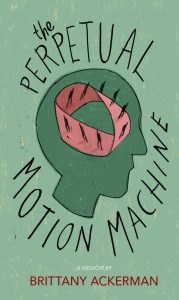 Brittany Ackerman’s new memoir, The Perpetual Motion Machine, might end dramatically with the stories of drug abuse and suicide attempts that she and the people in her life grow through, but it begins with what seems a fairly normal childhood in the United States. Her pain and difficulty is our pain and difficulty no matter who we are. Yet, she gives that time of her life, the period that some writers might think is normal and not worthy of the special attention of a memoir, the same attention that she gives to the more dramatic parts of her life.
Brittany Ackerman’s new memoir, The Perpetual Motion Machine, might end dramatically with the stories of drug abuse and suicide attempts that she and the people in her life grow through, but it begins with what seems a fairly normal childhood in the United States. Her pain and difficulty is our pain and difficulty no matter who we are. Yet, she gives that time of her life, the period that some writers might think is normal and not worthy of the special attention of a memoir, the same attention that she gives to the more dramatic parts of her life.
I love that she does not discount the significance of the everyday, and I think that’s why although I know the entire collection is profound, I am in love with the first half or so of the book. From a distance, childhood pain often seems insignificant, but the child living through it often feels true existential pain. Ackerman honors this time in her life instead of brushing past it. We see the profound admiration and love that she holds for her older brother, and of course, later when her older brother is in jeopardy and becomes distant from her, we feel the pain and loss of that relationship. She reminds us of the profound joy that we had when one of our parents gave us special attention and how painful it was to be forgotten. She reminds us of so many things.
I found that as I was reading it, I would put down the book for long stretches of time and just think about my own experiences in childhood. They haunt me still as they haunt everyone. Ackerman gave me a kind of permission as she was writing about playing with her Barbies and working out what her place in the world was and why she felt both excluded and loved in her life to think about the Batman dolls I played with as a child dealing with those same issues myself.
This is not to say that the second half of the memoir is without meaning. It is extraordinary. It brings us into the world of addiction and allows us to view it from the point-of-view of people who have lived it. But her move to help us understand the mundane rather than the exceptional is my favorite experience in this book. After all, we only call it mundane. It is not. These moments stick with us.
